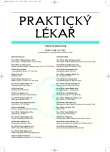Anaemia in chronic heart failure
Anémie u chronického srdečního selhání
Pacienti s chronickým srdečním selháním trpí poměrně často i anémií. Prevalence dosahuje přibližně 3 % až 60 % v závislosti na „limitní" hodnotě hemoglobinu. Příčiny vzniku anémie u chronického srdečního selhání jsou komplexní, ale hlavní roli hraje zvýšená aktivita prozánětlivých cytokinů, které vedou k útlumu tvorby erytropoetinu. Souhrn těchto pochodů je označován jako kardio-renální syndrom. Léčba anémie u chronického srdečního selhání vyžaduje další klinické studie. Uvádíme přehled základních mechanizmů vzniku anémie u tohoto onemocnění a přehled nejdůležitějších, doposud publikovaných prací.
Klíčová slova:
chronické srdeční selhání, anémie, kardio-renální syndrom
Authors:
M. Schejbalová; P. Niederle
Authors‘ workplace:
Kardiologické oddělení Nemocnice Na Homolce, Praha Přednosta: prof. MUDr. Petr Niederle, DrSc.
Published in:
Prakt. Lék. 2006; 86(11): 642-646
Category:
Of different specialties
Overview
Patients with chronic heart failure frequently suffer from a certain degree of anaemia. The prevalence of anaemia among these patients varies from about 3 % to 60 % according to the „border“ value of hemoglobin. The reasons for the development of anaemia in chronic heart failure are complex, but the main reason is the increased activity of pro-inflammatory cytokines, which causes a depressed production of erythropoietin. The sequence of events results in a condition described as cardio-renal-anaemia syndrome. The treatment of anaemia in chronic heart failure is still in its early stages and more clinical studies are required. The basic mechanism of development of anaemia and recently published studies are described in this article.
Key words:
chronic heart failure, anaemia, cardio-renal syndrome
Labels
General practitioner for children and adolescents General practitioner for adultsArticle was published in
General Practitioner

2006 Issue 11
- Advances in the Treatment of Myasthenia Gravis on the Horizon
- Hope Awakens with Early Diagnosis of Parkinson's Disease Based on Skin Odor
- Memantine in Dementia Therapy – Current Findings and Possible Future Applications
- Memantine Eases Daily Life for Patients and Caregivers
- Possibilities of Using Metamizole in the Treatment of Acute Primary Headaches
-
All articles in this issue
- Indications of allogeneic and autologous haematopoietic cells transplantation – Recommendations of the Czech Society of Haematology and Czech Society of Oncology of the J. E. Purkyně Czech Medical Association.
- Erectile dysfunction and its relationship to coronary heart disease
- Survey among general practitioners under 35 years of age
- Can Helicobacter pylori be one of the etiological factors of oropharyngeal carcinogenesis?
- Biochemical molecular mechanisms of heart failure
- New approaches to heart valve diseases in experimental and clinical cardiology
- Anaemia in chronic heart failure
- Treatment and prevention of alcohol related problems, general practicioner and evidence based medicine
- Molecular diagnostics of prevalent inherited gastrointestinal diseases: II. Colorectal cancer and diseases of the pancreas
- Valganciclovir in the pre-emptive treatment of cytomegalovirus infections following allogeneic stem cell transplantation.
- Experience in the treatment of torpid condylomata acuminata by 5% imiquimod cream
- General Practitioner
- Journal archive
- Current issue
- About the journal
Most read in this issue
- Experience in the treatment of torpid condylomata acuminata by 5% imiquimod cream
- Anaemia in chronic heart failure
- Indications of allogeneic and autologous haematopoietic cells transplantation – Recommendations of the Czech Society of Haematology and Czech Society of Oncology of the J. E. Purkyně Czech Medical Association.
- Valganciclovir in the pre-emptive treatment of cytomegalovirus infections following allogeneic stem cell transplantation.
